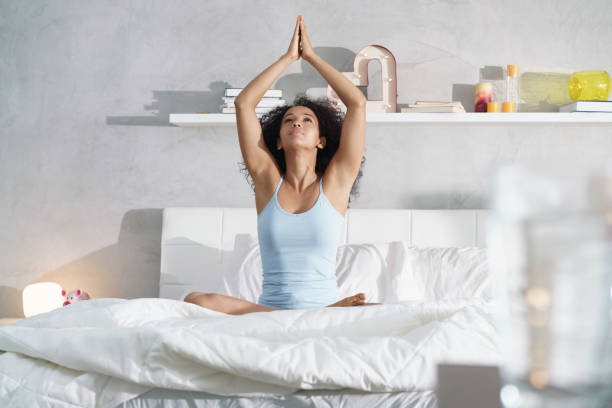Table of Contents
1. Introduction: The Importance of Sleep

Sleep is one of the most fundamental human needs, as essential as eating and breathing. We spend about a third of our lives sleeping, which indicates how crucial sleep is to our physical and mental well-being. A healthy sleep allows the body to recharge energy, recover from the fatigue of a long day, and regulate the activities of many internal organs.
In today’s fast-paced world, with modern technology, many people overlook the importance of maintaining adequate and proper sleep. Work pressures, personal life challenges, and habits such as using electronic devices like phones or computers before bed have diminished the quality of sleep for many. This not only leads to feelings of tiredness the following day but also increases the risk of serious health problems such as heart disease, diabetes, obesity, and mental disorders like anxiety and depression.
When you don’t get enough sleep or if your sleep quality is poor, your body won’t have time to fully recover, leading to declines in both health and cognitive function. Therefore, maintaining healthy sleep habits not only helps you feel more refreshed in the morning but also brings numerous other health benefits. In this blog, we will explore the different stages of sleep, the factors that affect sleep quality, and how to build healthy sleep habits.
2. The Stages of Sleep

Sleep is not a single state but rather divided into different stages. Each stage has its own specific function in helping the body recover and recharge energy. Understanding the stages of sleep will help you realize why it’s important to get adequate and proper sleep.
2.1. NREM Sleep (Non-Rapid Eye Movement)
NREM sleep (Non-Rapid Eye Movement) is the first and essential part of the sleep cycle. NREM consists of four stages:
- Stage 1: This is the transition stage from wakefulness to sleep, lasting only a few minutes. In this stage, heart rate, breathing, and eye movements start to slow down. It’s the lightest stage of sleep, and you can be easily awakened.
- Stage 2: This is light sleep, where heart rate and breathing slow further, and body temperature drops. It prepares the body for deep sleep.
- Stage 3 and 4: This is deep sleep, where the body fully enters recovery mode. The immune system strengthens, and cells regenerate and repair. As we age, the time spent in deep sleep decreases, which explains why older people tend to sleep less and are more easily disturbed.
2.2. REM Sleep (Rapid Eye Movement)
After completing the NREM stages, the body transitions to REM sleep, during which we dream the most. The brain is highly active, heart rate and breathing increase, and most muscles are temporarily paralyzed. REM sleep is crucial for memory consolidation, learning, and emotional regulation.
A normal sleep cycle lasts about 90 minutes and repeats several times throughout the night. A quality sleep typically includes a harmonious balance between NREM and REM stages. If sleep is frequently disrupted, you won’t be able to experience enough of these stages, which hinders full recovery.
3. Signs of Unhealthy Sleep

Many people may not realize that their sleep is inadequate or of poor quality until specific symptoms arise. Here are some signs that indicate you might be experiencing unhealthy sleep.
3.1. Daytime Fatigue
Feeling prolonged fatigue and lacking alertness during the day is the most common sign of unhealthy sleep. You may feel like you never have enough energy to complete tasks or that you need to rely on caffeine or other stimulants to stay awake. This suggests that your sleep is either insufficient or of poor quality.
3.2. Difficulty Concentrating and Memory Problems
If you notice difficulty focusing on tasks, learning, or frequently forgetting small details in daily life, it is likely due to inadequate sleep. Sleep, especially REM sleep, helps consolidate memories and support learning, so lack of sleep can diminish your cognitive performance.
3.3. Mood Swings
Poor sleep also has a significant impact on your emotions and mood. You might find yourself more irritable, easily frustrated, or impatient than usual. Moreover, chronic sleep deprivation is associated with severe psychological issues such as anxiety and depression.
3.4. Health Problems
Frequent health issues such as headaches, dizziness, high blood pressure, or a weakened immune system can also indicate that you need to reassess your sleep habits. Inadequate or shallow sleep prevents the body from fully recovering and regenerating, increasing the risk of developing serious illnesses.
4. Benefits of Healthy Sleep Habits

A quality sleep not only helps the body recover from a long day but also brings numerous health and mental benefits. Here are some of the key benefits of maintaining healthy sleep habits.
4.1. Enhanced Memory and Focus
During sleep, especially in the REM stage, the brain is highly active in processing information and consolidating memories. When you get enough quality sleep, your brain can store and categorize the information you’ve received throughout the day, improving your long-term memory and learning ability.
4.2. Reduced Risk of Serious Health Conditions
Chronic sleep deprivation is linked to a variety of serious health conditions such as heart disease, diabetes, and obesity. When you sleep sufficiently, your body maintains hormonal balance, regulates metabolic functions, and supports your immune system. On the other hand, lack of sleep raises cortisol levels – the stress hormone, which increases the risk of these diseases.
4.3. Boosted Immune System
During sleep, your body produces cytokines, a type of protein that plays a crucial role in helping the immune system fight against harmful agents like viruses and bacteria. When you get enough sleep, your body has time to heal and prepare to combat illnesses. Conversely, inadequate sleep weakens your immune system, making you more susceptible to getting sick.
4.4. Improved Physical and Athletic Performance
For those who engage in physical exercise or sports, sleep is essential for optimal performance. When you sleep well, your muscles have time to recover after strenuous activity, and your body is better prepared for the next workout. Lack of sleep decreases athletic performance, increases the risk of injury, and slows recovery.
4.5. Enhanced Mental Health and Emotional Regulation
Sufficient sleep helps regulate emotions and maintain a stable mood. When you don’t get enough sleep, your ability to control emotions diminishes, leading to irritability, anxiety, and even depression. Maintaining healthy sleep habits will give you a more positive outlook on life and improve the quality of your relationships.
5. Factors Affecting Sleep

Several factors can influence the quality of your sleep, from your surrounding environment to your daily habits. To improve your sleep, you need to understand these factors and make the necessary adjustments.
5.1. Sleep Environment
Your surrounding environment plays a crucial role in determining sleep quality. A quiet, dark, and cool room will help your body fall asleep more easily. Light from lamps or electronic devices such as phones or computers can disrupt the sleep cycle, so it’s best to avoid using these devices before bed.
The temperature of your room also significantly affects sleep. Studies show that the ideal room temperature for sleeping is between 16 to 20 degrees Celsius (60-68°F). Too hot or too cold can cause sleep disruptions and wake you up multiple times during the night.
5.2. Daily Habits
Your daily eating and living habits can also impact your sleep. Consuming too much caffeine, alcohol, or high-energy foods in the evening can make it harder for your body to fall asleep. You should avoid these stimulants in the afternoon or evening, and instead, opt for lighter options like warm milk, bananas, or nuts.
Moreover, your exercise routine affects sleep quality. Regular physical activity can improve sleep, but exercising too close to bedtime can raise your heart rate and breathing, making it harder for your body to relax.
5.3. Sleep Schedule
Maintaining a regular sleep schedule is crucial for healthy sleep. You should aim to go to bed and wake up at the same time every day, even on weekends. This helps the body maintain a stable circadian rhythm, making it easier to fall asleep and wake up naturally.
If you have a habit of staying up late and sleeping in on weekends, your circadian rhythm can become disrupted, leading to difficulty sleeping on workdays. This is often the cause of feeling fatigued after every weekend.
5.4. Health and Mental Well-being
Health and psychological issues can also affect your sleep. Individuals suffering from chronic conditions such as back pain, the flu, or long-term illnesses often struggle with maintaining uninterrupted sleep. Additionally, stress and anxiety can prevent you from falling asleep or cause you to wake up multiple times during the night. It’s important to manage stress and improve overall health to achieve quality sleep.
6. Building Healthy Sleep Habits

Building and maintaining healthy sleep habits is a process that requires patience and discipline. Below are some specific methods you can apply to improve your sleep.
6.1. Establish a Fixed Sleep Schedule
One of the most critical aspects of achieving healthy sleep is maintaining a consistent sleep schedule. You should set a regular bedtime and wake-up time every day, even on weekends. This helps your body maintain a stable circadian rhythm, making it easier to fall asleep and wake up naturally.
6.2. Relax Before Bed
Before bed, take time to relax and unwind. Avoid using electronic devices like phones or computers at least 30 minutes before sleeping. Instead, develop habits like reading, meditating, or listening to soothing music to reduce stress and prepare for sleep.
Meditation and yoga are two highly effective methods for relaxing before bed. They not only help the body loosen up but also calm the mind, reduce anxiety, and prepare the body for a deeper sleep.
6.3. Create an Ideal Sleep Environment
The ideal sleep environment is a dark, quiet, and cool bedroom. You can use blackout curtains to block out external light and consider using earplugs or a white noise machine to prevent disturbances if you live in a noisy area.
Pillows and mattresses also play a crucial role in ensuring comfort during sleep. Make sure you use pillows and a mattress that support your sleeping posture to prevent back and neck pain, and promote deeper sleep.
6.4. Limit Caffeine and Alcohol
Caffeine is a stimulant that can stay in your system for many hours after consumption. Therefore, avoid drinking coffee, tea, or other caffeinated beverages in the afternoon or evening. Instead, choose calming drinks such as caffeine-free herbal tea or warm milk to help your body relax.
Although alcohol may make you feel drowsy, it reduces sleep quality by disrupting the REM stage of sleep. This leads to fragmented and less restorative sleep. Therefore, limit alcohol consumption before bed.
6.5. Exercise Regularly
Regular physical exercise is a great way to improve sleep quality. Activities such as walking, running, yoga, or swimming can help relax the body and reduce stress. However, avoid exercising too close to bedtime, as it can increase your heart rate and breathing, making it harder to relax.
7. Exercises to Improve Sleep

There are many exercises and relaxation techniques you can perform to improve your sleep. Below are some exercises and methods you can try.
7.1. Mindfulness Meditation
Mindfulness meditation is one of the most effective mental relaxation methods, helping you reduce stress and anxiety before bed. You can perform short meditation sessions of 5 to 10 minutes before bed, focusing on your breathing and clearing negative thoughts. This helps calm the mind and prepare the body for deeper sleep.
7.2. Yoga Before Bed
Yoga not only improves flexibility and muscle strength but also helps you relax the body before bed. Gentle yoga poses such as child’s pose, cat-cow, and bridge pose can stretch muscles and release tension, making it easier to fall asleep.
7.3. Deep Breathing Exercises
Deep breathing is a very effective way to reduce stress and activate the parasympathetic nervous system – the system that helps your body relax. You can perform this exercise by sitting up straight or lying down, then inhaling slowly through the nose for 4 seconds, holding your breath for 4 seconds, and slowly exhaling through the mouth for 4 seconds. Repeat this process 5-10 times to experience relaxation.
8. Technology and Tools to Support Sleep

Technology plays an increasingly important role in modern life, and sleep is no exception. Here are some technologies and tools that can help you monitor and improve your sleep.
8.1. Sleep Tracking Apps
There are many smartphone apps that can help you track and analyze your sleep. Apps like Sleep Cycle, Pillow, and Calm not only track your sleep cycles but also offer meditation sessions and relaxing sounds to help you fall asleep easier. These apps typically use your phone’s sensors to monitor your breathing, heart rate, and sleep stages, then provide recommendations to improve your sleep.
8.2. Smartwatches and Health Trackers
Smartwatches like Apple Watch, Fitbit, and Garmin also have sleep-tracking features that help you understand your sleep quality. These devices can monitor your sleep cycles, heart rate, and calorie consumption to help you adjust your lifestyle for better sleep.
8.3. Smart Sleep Lights
Smart sleep lights are great tools for adjusting light levels in accordance with your circadian rhythm. Smart lights like Philips Hue or Casper Glow can automatically adjust brightness in the morning and evening to help your body wake up and fall asleep naturally.
9. Healthy Sleep Habits for Children and Teens

Children and teenagers have different sleep needs compared to adults. Establishing healthy sleep habits from an early age is essential for their overall physical and mental development.
9.1. Sleep Needs in Children and Teens
Children and teens need more sleep than adults because their bodies and brains are undergoing rapid development. Newborns need between 14 to 17 hours of sleep per day, while children aged 6 to 13 need about 9 to 11 hours of sleep. Teens aged 14 to 17 require 8 to 10 hours of sleep per night.
9.2. Establishing a Regular Sleep Schedule
Like adults, children need a consistent sleep schedule. Going to bed and waking up at the same time every day helps maintain their circadian rhythm and ensures they get enough rest. Parents should encourage their children to engage in relaxing activities before bed, such as reading or listening to calming music, to help them wind down and prepare for sleep.
9.3. Creating an Ideal Sleep Environment for Children
A child’s bedroom should be designed to be quiet, dark, and comfortable. Parents should limit their children’s use of electronic devices like phones, tablets, or TVs before bed, as the blue light emitted by these devices can interfere with their sleep cycle. Make sure that your child’s pillows, blankets, and mattress are comfortable to create the best sleeping conditions.
9.4. Proper Diet for Better Sleep
A balanced diet also plays a vital role in a child’s sleep. Children should consume enough nutrients and avoid sugary or caffeinated foods and drinks before bed. A light snack before bedtime can help them feel satisfied and fall asleep more easily.
10. Conclusion
Sleep is an essential factor for maintaining both physical and mental health. A quality sleep not only helps the body recover after a long day but also brings various benefits such as improved memory, a stronger immune system, and reduced risks of serious health conditions. By maintaining healthy sleep habits, you can have a healthier body and a sharper mind to face the challenges of everyday life.
Building healthy sleep habits may not be easy, but with persistence and the application of appropriate methods, you can significantly improve your sleep quality. Start by creating a consistent sleep schedule, relaxing before bed, and adjusting your environment to promote better sleep. By making small changes to your daily routines, you’ll notice a big difference in your health and mental well-being.
